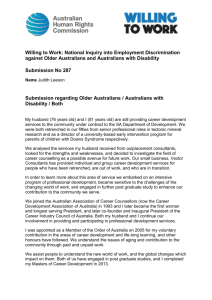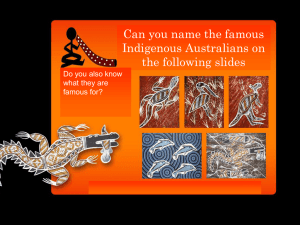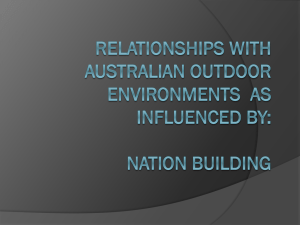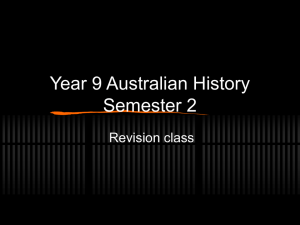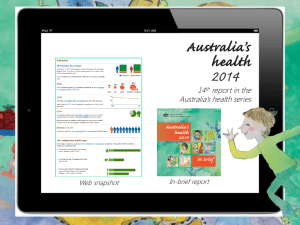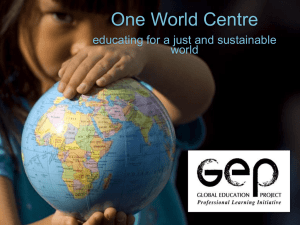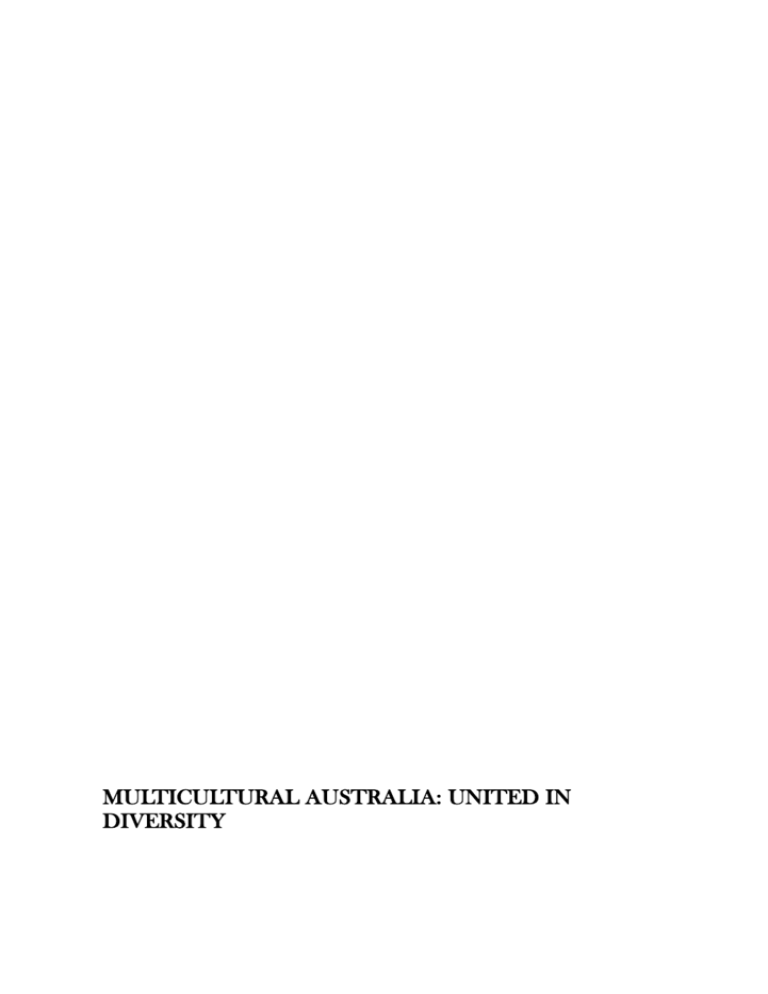
MULTICULTURAL AUSTRALIA: UNITED IN
DIVERSITY
MULTICULTURAL AUSTRALIA: UNITED IN
DIVERSITY
Updating the 1999 New Agenda for
Multicultur al Austr alia: Strategic
directions for 2003-2006
© Commonwealth of Australia 2003
This work is copyright. You may download, display, print and reproduce this material
in unaltered form only (retaining this notice) for your personal, non-commercial use
or use within your organisation. Apart from any use as permitted under the Copyright
Act 1968, all other rights are reserved.
Requests for fur ther authorisation should be directed to the Commonwealth Copyright
Administr ation, Intellectual Proper ty Branch, Depar tment of Communica tions,
Information Technology and the Ar ts, GPO Box 2154, Canberra ACT 2601 or at
http://www.dcita.gov.au/cca.
P RIME M INISTER C ANBERRA
Foreword
In 1999, I announced the New Agenda for Multicultural Australia as a statement of the government’s
multicultural policy. Over three years on, the government remains committed to nur turing our inclusive
society with its proud record of community harmony. This new statement reaffirms the gover nment’s
commitment to promoting diversity, understanding and tolerance in all areas of endeavour. These
actions are especially impor tant given the tragic events of 11 September 2001 in the United States of
America and 12 October 2002 in Bali and the changed global environment in which we live.
All Australians, regardless of their ethnic, cultural or religious background are encouraged to participate
fully in the wider Australian community to show a commitment to our nation, its democratic institutions
and its laws.
I commend this renewed statement of our multicultural policy and encourage all Australians to join the
government in ensuring that our diversity continues to be a unifying force for our nation.
(John Howard)
1
Minister’s Message
Austr alia’s multicultur al policies and programs signify the Government’s strong and enduring
commitment to community harmony and a migration program that does not discriminate on the basis
of ethnic origin, gender, race or religion.
This non-discriminator y migration program has brought people from across the globe and with them
their diverse cultural heritages. About six million migrants have settled in Australia since the Second
World War. They have made an enormous contribution to Australia, along with the unique contribution
of Australia’s Indigenous people, earlier migrants and their descendants. Together, we have built a
country that is vibrant, successful and outward looking, a country that provided safe haven for the
dispossessed, and a bright future for us all.
Australia today is a culturally and linguistically diverse society and will remain so. Like our sophisticated
migration program, our multicultural policy continues our tradition of successful nation building. It will
help us to ensure that we meet the challenge of drawing the best from the many histories and cultures
of the Australian people, within a framework of a uniting set of Australian values.
Philip Ruddock
Minister for Immigration and Multicultural and Indigenous Affairs
2
Minister’s Message
Our diversity is our strength and this update of the Government’s multicultural policy represents a
renewal of the principles and a refocusing of strategic directions to reflect changing circumstances.
Multiculturalism is about respect for and of each person in our society. Each person has a strength
through their culture and by harnessing this strength we all contribute to Australia.
Three years ago, communicating the relevance of multiculturalism to all Australians was of par ticular
impor tance. While we remain committed to this ongoing goal, and the fundamentals of the policy
remain valid, it is appropriate, par ticularly in light of international and domestic events of the last
three years, to refocus and renew our strategic directions.
In the next three years we will give increased emphasis to fur thering harmonious community relations,
ensuring equity in the provision of government services and harnessing the economic benefits of
diversity. Through our programs we will seek to ensure that Australians give practical effect to the
unifying values of Australian multiculturalism every day, in their workplaces and in society at large.
I look forward to implementing this policy to help secure a future in which our diversity remains a
source of economic benefit, cultural enrichment and social stability for all Australians.
Gary Hardgrave
Minister for Citizenship and Multicultural Affairs
3
4
Multicultural Australia: United in Diversity
Updating the 1999 New Agenda for Multicultural Australia:
Strategic directions for 2003-2006
One of the greatest strengths of our nation is our cultural diversity. The Government is committed to
Multicultural Australia, with policies and programs that unite us as Australians working to advance
Australia fair.
The key to the success of Australian multiculturalism is inclusiveness. Every Australian benefits from
our diversity and all Australians have the right to be active and equal par ticipants in Australian society,
free to live their lives and maintain their cultural traditions.
Australia’s Indigenous people and their culture have made and continue to make a unique contribution
to this country. Their contribution together with the significant contributions of the early settlers and
more recent migrants have helped build the nation we belong to today.
With 43% of the population born overseas or with at least one parent born overseas, and with some
200 languages between us, we have one of the most cosmopolitan populations in the wor ld.
Multiculturalism celebrates Australian traditions, recognising that our culture is vibrant, multifaceted,
living and constantly evolving.
Cultural and linguistic diversity was a feature of life for the first Australians, well before European
settlement. It remains a feature of modern Australian life, and it continues to give us distinct social,
cultural and business advantages.
If we are to continue to reap the rewards of our diversity, it is impor tant that policies and programs
respond to the associated ongoing benefits and challenges.
The Commonwealth Government is committed to multicultural policies that maximise these benefits
and address the challenges in order to build on Australia’s achievements as a peaceful and prosperous
nation. Its vision is of a vigorous, multicultural Australia, united by a shared future, an overriding
commitment to our nation and its democratic institutions and values, and suppor t for the rule of law,
with English as a common language.
In 1999, the Prime Minister, the Hon John Howard MP, announced the New Agenda for Multicultural
Australia as a statement of the Government’s multicultur al policy. Some three years on, following an
assessment of progress in implementing the New Agenda, it is appropriate to reaffirm our commitment
to the policy and to articulate the strategic direction for multicultural policy for the next three years.
5
Australian multiculturalism - the Policy
The Government is committed to ensuring that all Australians have the oppor tunity to be active and
equal par ticipants in Australian society, free to live their lives and maintain their cultural traditions.
This social equity is enshrined in Commonwealth, State and Territory legislation.
Australian multiculturalism recognises, accepts, respects and celebrates cultural diversity. It embraces
the heritage of Indigenous Australians, early European settlement, our Australian-grown customs and
those of the diverse range of migrants now coming to this country.
The freedom of all Australians to express and share their cultural values is dependent on their abiding
by mutual civic obligations. All Australians are expected to have an overriding loyalty to Australia and
its people, and to respect the basic structures and principles underwriting our democratic society.
These are the Constitution, Parliamentary democracy, freedom of speech and religion, English as the
national language, the rule of law, acceptance and equality.
These civic obligations reflect the unifying values of Australian Citizenship. Australian Citizenship involves
reciprocal responsibilities and privileges and enables individuals to become fully contributing members
of the Australian community. Citizenship is a strong unifying force in our diverse multicultural community.
Our commitment to and defence of Australian values of equality, democracy and freedom unite us in our
diverse origins, and enhance the ability of us all to participate fully in all spheres of Australian society.
In summary, the Government’s aim is to build on our success as a culturally diverse, accepting and open
society, united through a shared future, and a commitment to our nation, its democratic institutions and
values, and the rule of law. This vision is reflected in the four principles that underpin multicultural policy:
Responsibilities of all – all Australians have a civic duty to suppor t those basic structures
and principles of Australian society which guarantee us our freedom and equality and enable
diversity in our society to flourish;
Respect for each person – subject to the law, all Australians have the right to express
their own culture and beliefs and have a reciprocal obligation to respect the right of others
to do the same;
Fairness for each person – all Australians are entitled to equality of treatment and
oppor tunity. Social equity allows us all to contribute to the social, political and economic life
of Australia, free from discrimination, including on the grounds of race, culture, religion,
language, location, gender or place of bir th; and
Benefits for all – all Australians benefit from productive diversity, that is, the significant
cultural, social and economic dividends arising from the diversity of our population. Diversity
works for all Australians.
This multicultural policy provides a framework for maximising the social, cultural and economic benefits
that cultural diversity brings to all Australians. But more than that, it actively promotes good community
relations and social harmony among us all.
6
Strategic directions
More so than at any time in decades, Australian community harmony could be tested as we face
cur rent challeng es with str ength and resilience. The ter rorist attac ks of 11 September 2001
and 12 October 2002, and the consequences of these events, have had a significant impact on
community relations in Australia. Innocent Australians are being wrongfully blamed by association,
are being threatened or isolated, have been hur t, or have had proper ty damaged.
Some terrorists claim religious sanction for their actions despite there being no religious or cultural
basis for terrorism.
Australians now see themselves as directly threatened by terrorism. In this context, community harmony
and social cohesion are pivotal elements in enabling Australia to contribute effectively to the international
effor t to combat terrorism, and in safeguarding Australians domestically. The Government believes
firmly that Australian multicultural policy provides a framework of national unity and a coherent ethos
for a diverse Australia at a time of conflict, as well as in times of peace. National security begins with
domestic community harmony.
The Government’s strategic directions for the next three years will address these issues and build on
the achievements of the New Agenda – with par ticular focus on young people, regional and rural
Australia, local government, business and media.
Community Harmony
Australians have embraced respect for cultural diversity, making our nation one of the most harmonious
societies in the world. The current international environment, where culture, ethnicity and religion
have become more sensitive and emotive matters, is a challenge to community harmony. International
and domestic factors point to the importance of continuing to promote Australian values, and Australian
multiculturalism encourages Australians to support each other, no matter what happens beyond our shores.
The Government will continue to promote community harmony and social cohesion through numerous
avenues. It will work closely with a range of individuals and community, business and government
organisations, in condemning actions and statements which threaten community harmony, and continue
to promote acceptance and understanding among all Australians for all Australians.
The Government has initiated and will continue to pursue a formal cooperative approach between the
Commonwealth and State and Territory Governments to respond to threats to community harmony.
This approach will seek to establish more efficient and effective mechanisms for responding to community
tension.
The Government is committed to pursuing the Living in Harmony initiative, including Harmony Day
activities, to promote community harmony. In May 2002, the Government extended the Living in
Harmony initiative for a fur ther four years, with the provision of $3.5 million a year from 2002-2003.
The annual Living in Harmony community grants program allows for an improved strategic approach,
including specific targeting of priority areas for funding and fur ther support for grassroots participation
7
in developing local solutions to local problems. The par tnership element of the Living in Harmony
initiative will be linked more closely with its grants program so that local issues can inform national
issues and vice versa.
Harmony Day, developed by the Commonwealth Government in 1999, and celebrated on 21 March
each year, provides an oppor tunity: to promote our community’s success as a multicultural society;
recommit ourselves to respect, goodwill and understanding between all Australians of all backgrounds;
and say “no” to racism. The Government will continue to build on existing par tnerships with iconic
spor ting and corporate organisations to ensure the strong message of community harmony reaches
an ever-increasing audience.
Access and Equity
The primary objective of the Access and Equity strategy is to ensure that gover nment ser vices and
programs are attuned to the realities of diversity in Australian society. There is a strong case for
better developing even greater levels of government investment in vulnerable individuals. Otherwise,
the cost of remedying the problems that stem from social dislocation and lost opportunities for personal
advancement will be greater in the years ahead. This is par ticularly relevant for refugees with a
history of tor ture and trauma and who may have had a chaotic educational background or those who
do not have their qualifications recognised in Australia.
In this regard, settlement programs to assist migrants and humanitarian entrants are positive
investments that contribute to each person’s ability to par ticipate fully in our multicultural society,
realise their personal aspirations, and benefit Australia.
In June 1998, the Government launched the Charter of Public Service in a Culturally Diverse Society.
The Charter is a nationally consistent approach to ensuring that government services are delivered in
a way that is sensitive to the language and cultural needs of all Australians. The Government remains
committed to the implementation of the Charter, through the performance management framework
adopted in 2000.
The Government is committed to effective analysis of outcomes by agencies and more streamlined
repor ting in order to enhance accountability and improve access and equity.
The Government will work with existing planning processes at all levels of government to ensure
equitable access by all Australians to ser vices.
Productive Diversity
In the knowledge-based economy of this millennium, where people are the key to a nation’s productivity
and competitiveness, Australia’s multiculturalism is a most valuable resource. It encourages diversity
in ways of thinking and stimulates innovation and creativity. It helps us to forge links with the rest of
the world that can deliver increased trade and investment through the expansion of markets and the
development of diverse goods and ser vices.
8
The Government is committed to promoting the economic benefits that can be derived in both the
domestic and international markets by capitalising on Australia’s wealth of cultural and linguistic skills
and on the social and business networks of Australia’s migrants. This is pursued through the Productive
Diversity program.
The main emphasis of the Productive Diversity program in the last three years has been to articulate
a sound business case for diversity management. The achievements to date will be built on through
fur ther development of business case studies and tools to suppor t Australian businesses to maximise
the benefits of diversity in the workplace and the community.
The Productive Diversity and Harmony Day par tnerships with the corporate sector and community
organisations will be fur ther developed, among other things, to make an effective contribution to the
implementation of the Prime Minister’s Business Community Par tnership initiative.
In the next three years, the Government is committed to integrating its Access and Equity and Productive
Diversity strategies to ensure they convey consistent messages to the public and private sectors. The
economic and social equity benefits from these policies will enhance community harmony.
Council for Multicultural Australia
In 2000 the Government established the Council for Multicultural Australia with members appointed
for three years. The Government is committed to the appointment of a new Council for a fur ther three
years. The new Council for Multicultural Australia will assist the Government to build on achievements
to date in implementing the New Agenda for Multicultural Australia with renewed strategic focus on
promoting community harmony and the benefits of our cultural diversity.
9

